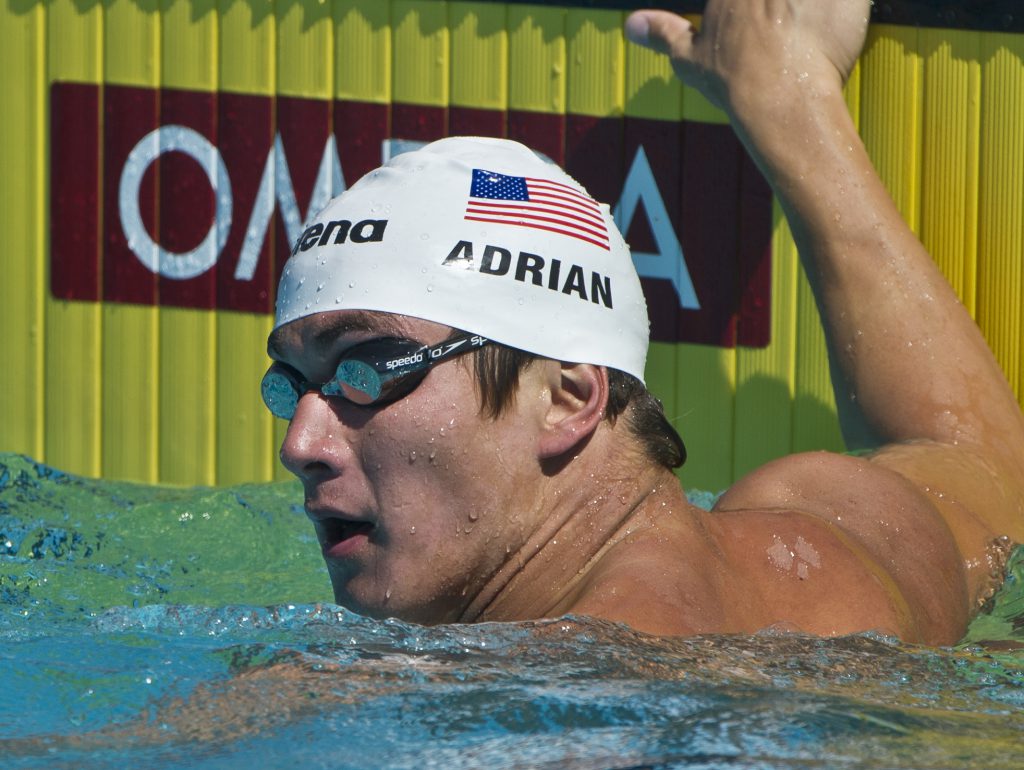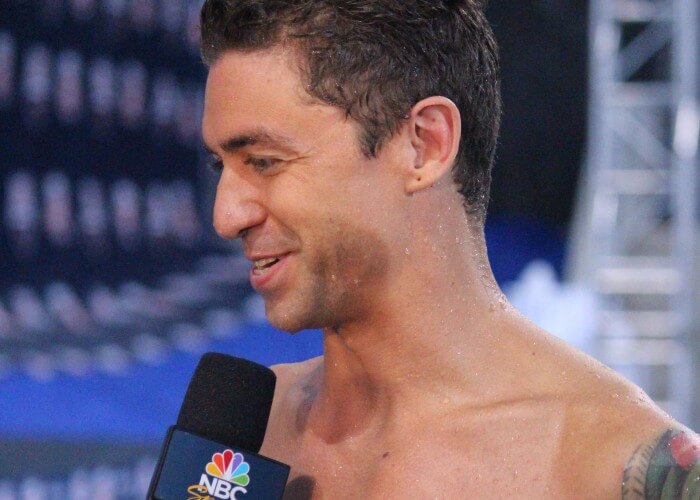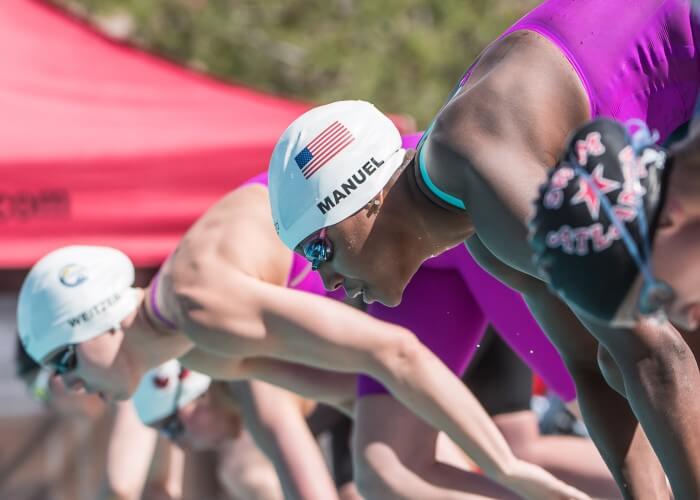Why Swimming Races Shouldn’t Be About Race

By Julia Cunningham, Swimming World College Intern
I will preface this article by explaining that I am in no way articulating anyone else’s viewpoint but my own personal one.
I am a female, Chinese-American athlete. I also am adopted, so without seeing me, I could be Caucasian. I have competed for club, high school and collegiate teams in Pennsylvania, Iowa, New Jersey, and New York, and, while I have never faced any racial discrimination as a minority, there are some things that I have noticed through my experiences.
Swimming, of course, is expensive and time-consuming. By default, then, it traditionally is a middle, upper-middle class sport: a “white person” sport. While it is moving away from that stereotype at the lower levels, the statistics in colleges are still appalling. Data collected during the 2014-15 school year shows 19 percent of DI swimmers, and 21 percent of DIII swimmers are non-white.
After attending a DIII NCAA Conference in San Antonio, Texas on the Ethnic Minority Grant, I became more aware of the impact of these statistics. I noticed that the deck at DIII NCAA Championships in Greensboro this year contained a very small percentage of minority athletes and coaches.
Growing up swimming, there was at least one other Asian athlete on my team, even in Iowa. There were never many African-American swimmers on my teams. Now, when I go back to coach the younger age groups, there is a noticeable rise in Asian and African-American swimmers taking part in the sport.
An article that Swimming World published regarding Nathan Adrian got me thinking about the large impact minorities have despite their small numbers. While the article was titled “Nathan Adrian And Some Thoughts On Looks And Race And Speed…“, it seemed to me to only focus on looks. It’s not as though Adrian doesn’t have a long list of credentials that don’t involve his mixed race. While his background is certainly a point of interest, it shouldn’t be what defines him.
Likewise, whenever an African-American swimmer stands out, the headline is his or her last name, preceded by “African-American.” Of course, due to the low numbers of minority swimmers, seeing impressive results from minorities would seem to be an anomaly.
At the 2015 Women’s DI NCAA Championships, Simone Manuel, Lia Neal and Natalie Hinds made history as they stood atop the podium as the top three finishers in the 100-yard freestyle. This was the first time that three African-American swimmers went 1-2-3 in any event at NCAAs.

Photo Courtesy: Griffin Scott
In 2006, Cullen Jones became the first African-American to hold a world record as a part of the 4×100-meter freestyle relay along with Michael Phelps, Neil Walker and Jason Lezak. In 2000, Anthony Ervin became the first African-American swimmer to medal at the Olympics, taking gold in the 50-meter freestyle, and silver as a member of the 4×100-meter freestyle relay. Ervin is of European descent on his mother’s side and African-American and Native American descent on his father’s side.
After the gold medal race, a reporter asked Ervin what it felt like to be the first swimmer of African-American descent to win gold. Referring to this moment in a 2012 interview, Ervin stated, “I didn’t know a thing about what it was like to be part of the black experience. But now I do. It’s like winning gold and having a bunch of old white people ask you what it’s like to be black. That is my black experience.”
Media coverage of these races tended to focus on the race aspect: the paths that these athletes have paved for other African-Americans in the sport. The problem I have with this type of coverage is that the issue should not be race. It should be speed.
I have conflicting opinions about this. There certainly is something to be said for Jones setting world records in the pool when, as a younger athlete, “parents started muttering in his direction, ‘Shouldn’t he be playing basketball?’” At the same time, stating the fact that he is the first African-American detracts from the fact that he holds a world record.
The same goes for Manuel, Neal and Hinds. After 2015 NCAAs Manuel said, “It was definitely a milestone – something we could all be proud of. But in all honesty, what we accomplished didn’t really hit me until weeks later.” The immediate focus for Manuel was the national title she earned and American record she set. She went on to say that once the depth of their accomplishment hit, “it became really clear to me how important it was in a sport like swimming. It’s something I’m very proud of.”
Of course the race aspect is important, but so is the race aspect: the hard work, the early hours, the impossible sacrifices that all athletes put in to get where they are in the sport.

Photo Courtesy: Peter H. Bick
Going back to Nathan Adrian. Casey Barrett compared Adrian with Ryan Lochte, two men who don’t swim the same races, on their looks. This is yet another example of, albeit in a completely different context, when the race of the swimmer outshines their accomplishments. Adrian is the American record-holder in the 50-meter freestyle and an Olympic gold medalist in the 100-meter freestyle, among other accomplishments.
For all minority swimmers, my view is that what they accomplish in the pool should be the spotlight. Pointing out the fact that they are minorities only highlights the fact that there are so few minorities in the sport in America. We have to remember that there is still the same amount of passion and dedication that goes into every stroke taken and every decision made by these swimmers.
Manuel decided to redshirt this year in order to best prepare for Olympic Trials.
“If you let the noise in, you can’t stay mentally focused, and to compete at this level and be successful, you have to be able to block it out,” Manuel said. “If you don’t, you welcome the opportunity for your mentality to break down.” My hope is that Manuel is racing for herself in Omaha. Her accomplishments at Trials and hopefully in Rio are first her own, and then are stepping stones for African-American swimmers following her.
Manuel does not swim just for African-Americans, in the same way that Adrian does not swim just for admiring glances. They swim because it is a sport that they love and are extremely good at. Their accomplishments reflect their own dedication. As Manuel said, “I prefer to get in the pool and work hard, improve on the details of my race and focus on what I want to accomplish.”




I have never considered the race or nationality of the athletes in the pool. Why is this now so important? I thought we were not supposed to see race anymore. I love Anthony Ervin’s response. The author of this article obviously has had some influential teachers in college. Not for the better either.
Everything you saw, anywhere you were was telling you a story about race in this country. Hey Todd, I have a white friend who only dates black women. So my white friend likes black women, so what. But if that same white friend only dated white women, you wouldn’t say he likes white women, would you?
I’m sorry I wasn’t done. Why is this important now????!!! When was it not important? When black people were slaves, reconstruction, post-reconstruction lynching times, segregation, when minorities continue to get turned down for jobs and bank loans because they’re minorities. When unarmed black people, but very few unarmed white people keep getting choked to death or shot by police? Please go to the library.
If you are going to comment, please stay on topic.
Still trying to figure out why SW is the forum for this topic?
This may not be NCAA D1, but check out this photo of the 2016 NY State Public High School Championship winning team from Half Hollow Hills School District on Long Island at the below link. The sport is changing and changing fast.
http://webpapersadmin.bcnewsgroup.com/portals/uploads/whidbey/.DIR288/tack-at-state.jpg
I just don’t see the need for the PC BS on swimming world. Should be posted on some left wing nut job web site.
Overdramatic